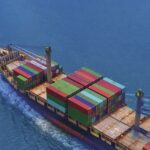12th February, 12pm
US military strikes five vessels near Yemen port
The US military carried out strikes against five targets north of Yemen’s port of Hodeidah over the weekend.
In a statement, US Central Command said that American forces had “successfully conducted self-defense strikes” against “two unmanned surface vessels (USV) and three mobile anti-ship cruise missiles” that were “prepared to launch against ships in the Red Sea”.
As the situation in the Red Sea continues, our team are on hand should you have any questions or concerns. Get in touch here.
7th February, 12pm
HMS Richmond takes over Red Sea patrol
Royal Navy frigate HMS Richmond has taken over patrols to protect shipping in following ongoing attacks on vessels.
The Type 23 frigate replaces HMS Diamond has come under fire from Iran-backed Houthi forces on three occasions during its time on duty in the region.
6th February, 1pm
A British-owned vessel has been attacked on the Red Sea
UK Maritime Trade Operations (UKMTO) has reported that a British-owned cargo vessel was attacked with a projectile.
No serious injuries were reported and the vessel was deemed safe to continue its journey.
The attack took place near Yemen just after midnight on the 6th of February.
6th February, 10am
Shippers Continue to Adjust to Cape Diversions
All the major carriers are diverting their Asia-Europe services around the Cape of Good Hope, rather than transiting the Suez Canal, with several temporarily adjusting their proforma networks and providing revised ETAs to customers that reflect ongoing delays.
Despite the ongoing situation in the Red Sea, freight rates have started to ease following a spike in prices over recent weeks.
As always, our team are on hand should you have any concerns and we advise our customers to get in touch.
6th February, 9am
CMA CGM: All services initially routed via the Red Sea passage will now follow the Cape of Good Hope
As of the 1st February and until further notice, CMA CGM has announced that all services initially routed through the Red Sea will now follow the Cape of Good Hope routing.
This decision has been made to ensure the safety of seafarers as the situation in the Red Sea continues.
25th January
Maersk ships come under fire in latest Houthi missile attack
US-flagged Maersk Detroit and Chesapeake were under escort by US naval vessels when Houthi militants attacked them with a barrage of missiles causing them to abandon their naval convoy and flee the Red Sea.
22 naval vessels are patrolling the Red Sea under the auspices of Operation Prosperity Guardian. Meanwhile, the US and UK have conducted at least eight airstrikes on Houthi targets since the campaign began.
19th January
Maritime advisory warns Red Sea attacks already bigger issue for supply chain than pandemic
The Red Sea crisis and continued Houthi rebel attacks on cargo ships and tankers is now expected to have a bigger impact for shipping than the early pandemic, according to Sea-Intelligence which measures changes in vessel capacity.
The longer transit around the Cape of Good Hope is having a significant impact on vessels, but unlike during Covid, there is excess vessel capacity currently unused which could be put back into service and help solve the issues.
17th January, 12pm
US attacks Houthi anti-ship missiles – vessel hit in Red Sea
The U.S. military carried out new strikes in Yemen on Tuesday against anti-ship ballistic missiles in a Houthi-controlled part of the country as a missile struck a Greek-owned vessel in the Red Sea.
16th January, 12pm
Container shortages following re-routings, delays and cancellations
Container shortages are expected as a result of the ongoing difficulties in the Red Sea.
There are 780,000 standard containers fewer than anticipated arriving in Asia just before the Chinese Lunar New Year, which falls in mid-February this year, according to the Baltic Exchange.
Lack of equipment will ultimately put additional pressure on costs as the scarcity increases demand.
11th January, 12pm
Capacity concerns and increased rates expected following the Red Sea Crisis
As a result of the ongoing delays, container shortages, and uncertainty following the events in the Red Sea the industry is anticipating a surge in pricing.
Ships are quickly filling up and with Chinese New Year on the horizon, it is expected that rates will continue to rise well into February.
As of the 10th January, the United Nations Security Council has adopted a resolution demanding the Houthis immediately cease all attacks on merchant and commercial vessels. This will hopefully result in a quicker resolution to the ongoing difficulties in the region.
As always, our team are on hand should you have any concerns and we advise our customers to get in touch.
We will continue to monitor the situation, employing mitigation tactics wherever possible to reduce the impact on our customers.
2nd January, 9am
Red Sea Attack sinks three ships, killing 10 leaving Maersk to continue rerouting via Cape of Good Hope
US helicopters repelled an attempted attack on a Maersk container vessel in the Red Sea earlier this week. The attack comes following Operation Prosperity Guardian which hoped to provide additional security for ships passing through the area.
The naval battle commenced in the early hours of Sunday as attackers sought to board the Singapore-flagged Maersk Hangzhou, Maersk, and U.S. Central Command (CENTCOM) confirmed.
The battle sunk three attacking ships and killed 10 militants.
As always, we will continue to monitor the situation and update our customers regularly. If you have any questions at all we encourage you to get in touch with us here.
28th December, 9am
Some Shipping Lines Resume Shipping Through the Red Sea
Maersk and CMA CGM are preparing to restart operations in the Red Sea, following the recent US-led multinational naval operation Operation Prosperity Guardian (OPG). The operation has been set up to protect shipping from attacks by Houthi rebels in the region.
Maersk stated “With the OPG initiative in operation, we are preparing to allow for vessels to resume transit through the Red Sea both eastbound and westbound. We are currently working on plans for the first vessels to make the transit and for this to happen as soon as operationally possible.”
CMA CGM also announced on 26 Dec that some vessels have made the transit through the Red Sea and that it was “currently devising plans for the gradual increase in the number of vessels transiting through the Suez Canal. This decision is based on an in-depth evaluation of the security landscape and our commitment to the security and safety of our seafarers.”
Hapag-Lloyd said it considers passage still “too dangerous” and will continue to reroute its ships via the Cape of Good Hope. A review of this decision is scheduled for this Friday 29th. Evergreen and other shipping lines remain rerouting vessels “until further notice.”
26th December, 12pm
All Maersk Asia/Middle East – Europe sailings Cape-bound until mid-Feb
Carriers have confirmed that vessels normally routed through the Suez Canal will continue to be redirected through the Cape of Good Hope until at least mid-February.
Customers can expect ongoing delays, however schedules are being continually updated to reflect these changes.
19th December, 12pm
The below carriers have suspended their services through the Suez Canal until further notice:
- ONE Line
- Maersk
- MSC
- Evergreen
- CMA CGM
- COSCO
We are still awaiting communication from the other carriers and the situation is ever developing.
Possible business and industry impacts:
- Longer transit times – an additional 10-14 days on the voyage, taking a longer route around the Cape of Good Hope
- Emergency surcharges being imposed by the carriers under the “force majeure” clause on your bill of lading
- Congestion and delays at port of origin and discharge, as vessel arrivals “bunch” together
- Equipment shortages, as containers will be in use for longer
- Capacity constraints, as vessels take longer to complete a voyage; less frequent sailings
- Rate increases caused by supply/demand imbalance
- Bunker (fuel) costs increasing due to oil index surge (oil tankers use the same shipping lane)
- Insurance costs (your own policy may increase), war risks added by carriers
Whilst we hope for the best, it would be wise to prepare for all eventualities as we go into the New Year. Our team are on hand should you have any questions or concerns.
18th December, 12pm
Over the weekend, a number of carriers have suspended passage through the Red Sea strait until further notice, following rebel attacks in the waters off Yemen.
Three cargo ships from Maersk, Hapag-Lloyd and MSC have been attacked in the Red Sea by drones and missiles so far. Iran-backed rebels, the Houthis, said they were targeting vessels to pressure Israel over its war with Hamas in the Gaza Strip. No injuries were reported.
The vessels came under attack in the Bab Al Mandab – a narrow strait of water that is vital for global trade and one the world’s most important routes for oil and fuel shipments. About 17,000 ships and 10% of global trade pass through it yearly.
MSC, CMA CGM, Maersk, Hapag-Lloyd, COSCO, and other carriers are considering taking action in the coming hours. Alternative routes around the Cape of Good Hope in South Africa could add a further 10 days to the transit time from Asia, so carriers will carefully weigh up all the options and risks before taking action. However, you can expect delays and impacts to published sailing schedules whilst this fast-moving situation develops.
The DKT team are here to help, should have any questions about the impact on your shipments.



